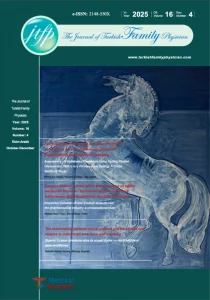Factors related to exam anxiety
Exam anxiety, is defined as an intense anxiety that prevents the effective use of the knowledge learned before the exam and leads to a decrease in succsess.
Exam anxiety is an important problem that causes a decrease in performance and is accompanied by serious psychological problems. In studies conducted in different samples, anxiety symptoms and exam related anxiety were examined. In a study conducted on students of the Faculty of Medicine, it was found that 65% of students experience exam anxiety for various reasons and female students experience more exam anxiety than male. In the study conducted to determine the relationship between exam anxiety levels and sleep quality of highschool senior students, it was shown that students have exam anxiety and this situation negatively affects sleep qualty. Again, in another study examining the effects of parents’ expectations on the exam anxiety on high school seniors, factors such as familiy structure, educational status of the parents and income status of the family were examined. It was found that the family structure was effective on examination enxiety and anxiety level was higher in girls than boys. In the study conducted on the test method, which is an examination technique, the effect of various intervention techniques in the treatment of test anxiety was examined and cognitive behavioral methods were found to be the most effective. In this review, it is aimed to review the factors related to exam anxiety in line with the literature.
References
- Softa HK, Karaahmetoğlu GU, Çabuk F. Lise son sınıf öğrencilerinin sınav kaygısı ve etkileyen faktörlerin incelenmesi. Kastamonu Eğitim Dergisi 23(4):1481-94.
- Öner N, Le Compte A. Süreksiz Durumluk/Sürekli Kaygı Envanteri El Kitabı. 2. Basım. İstanbul, Boğaziçi Üniversitesi Yayınevi, 1998.
- Bacanlı F, Sürücü M. İlköğretim 8. sınıf öğrencilerinin sınav kaygıları ve karar verme stilleri arasındaki ilişkilerin incelenmesi. Kuram ve Uygulamada Eğitim Yönetimi 2006;45(45):7-35.
- Neuderth S, Jabs B, Schmidtke A. Strategies for reducing test anxiety and optimizing exam preparation in German university students: a prevention-oriented pilot project of the University of Würzburg. Journal of Neural Transmission 2009;116(6):785-90.
- Lufi D. Okasha S. Cohen A. Test Anxiety and Its Effect on the Personality of Students with Learning Disabilitie. Learning Disability Quarterly 2004;27:176-84.
- Khoshhal KI, Khairy GA, Güraya SY, Guraya SS. Examanxiety in the undergraduate medical students of Taibah University. Medical teacher 2017;39(sup1):22-6.
- Kaya A, Bozaslan H, Genç G. Üniversite öğrencilerinin anne-baba tutumlarının problem çözme becerilerine, sosyal kaygı düzeylerine ve akademik başarılarına etkisi. Dicle University Journal of Ziya Gokalp Education Faculty 2012;18:208-25.
- Akkoyun F. Kendini gerçekleştirme ve kaygı. Ankara Üniversitesi Eğitim Bilimleri Fakültesi Dergisi 1988;21(1): 81-90.
- Güler D, Çakır G. Lise son sınıf öğrencilerinin sınav kaygısını yordayan değişkenlerin incelenmesi. Turkish Psychological Counseling and Guidance Journal 2016;4(39):82-94.
- Köse S, Yılmaz ŞK, Göktaş S. Lise son sınıf öğrencilerinin sınav kaygı düzeyleri ile uyku kalitesi arasındaki ilişki. J Psychiatric Nurs 2018;9(2):105-11.
- Boyacıoğlu NE, Küçük L. Ergenlikte mantık dışı inançlar sınav kaygısını nasıl etkiliyor? Journal of Psychiatric Nursing 2011;2(1):40-5.12.
- Çivitci A. Ergenlerde mantıkdışı inanç ve sürekli kaygı ilişkisi. İnönü Üniversitesi Eğitim Fakültesi Dergisi 2006;7(12): 27-39.
- Güler D, Çakır G. Examining predictors of test anxiety levels among 12th grade high school students. Türk Psikolojik Danışma ve Rehberlik Dergisi 2013;4(39):82-94.
- Tümerdem R. Dicle Üniversitesi Eğitim Fakültesi ve Fen-Edebiyat Fakültesi Kimya son sınıf öğrencilerinin kaygılarını etkileyen etmenler. Elektronik Sosyal Bilimler Dergisi 2007;6(20):32-45.
- Hahn H, Kropp P, Kirschstein T, Rücker G, Müller-Hilke B. Test anxiety in medical school is unrelated to academic performance but correlates with an effort/reward imbalance. PloS one 2017;12(2): e0171220.
- Şahin H, Günay T, Batı H. İzmir ili Bornova ilçesi lise son sınıf öğrencilerinde üniversiteye giriş sınavı kaygısı. Sürekli Tıp Eğitimi Dergisi 2006:15(6):107-13.
- Boztepe D. Ebeveyn beklentilerinin sınav kaygısı üzerindeki etkisi: Lise son sınıf öğrencilerine yönelik bir değerlendirme. İstanbul Aydın Üniversitesi Sosyal Bilimler Enstitüsü, 2016. http://hdl.handle.net/11547/2161 adresinden 24.02.2021 tarihinde erişilmişrtir.
- Thergaonkar NR, Wadkar A. Relationship between Test Anxiety and Parenting Style. Journal of Indian Association for Child and Adolescent Mental Health 2007;3(1):10-12.
- Günay O, Öncel ÜN, Erdoğan Ü, Güneri E, Tendoğan M, Uğur A ve ark. Lise son sınıf öğrencilerinde durumluk ve sürekli anksiyete düzeyini etkileyen faktörler. Sağlık Bilimleri Dergisi 2008;17(2): 77-85.
- Canbaz S, Sünter AT, Aker S, Pekşen Y. Tıp fakültesi son sınıf öğrencilerinin kaygı düzeyi ve etkileyen faktörler. Genel Tıp Derg 2007;17(1):15-19.
- Iqbal S, Gupta S, Venkatarao E. Stress, anxiety and depression among medical undergraduate students and their socio-demographic correlates. Indian J Med Res 2015;141(3):354-7.
- Hashmat S, Hashmat M, Amanullah F, Aziz S. Factors causing exam anxiety in medical students. Journal-Pakistan Medical Association 2008;58(4):167.
- Lay CH, Schouwenburg HC. Trait Procrastination, Time Management. Journal of social Behavior and personality 1993;8(4):647-62.
- Sansgiry SS, Bhosle M, Sail K. Factors that affect academic performance among pharmacy students. American journal of pharmaceutical education 2006;70(5): 104.
- Waterworth S. Time management strategies in nursing practice. Journal of advanced nursing 2003;43(5):432-40.
- Pesen A, Mayda AS. Tıp fakültesi öğrencilerinin depresyon, anksiyete, stres düzeyleri ve ilişkili faktörler. Sakarya Tıp Dergisi 2020;10(2):240-52.
- Afzal H, Afzal S, Siddique SA, Naqvi SEA. Measures used by medical students to reduce test anxiety. JPMA The Journal of the Pakistan Medical Association 2012; 62(9):982-6.
- Kora M, Yazgan MY. Okullarda ruh sağlığı çalışmaları. Türkiye Klinikleri Pediatrik Bilimler-Özel Konular 2007;3(3):82-8.
- Weist MD. Expanded school mental health services. In “Advances in Clinical Child Psychology”. (Eds)Thomas HO, Ronald JP. Boston, Springer Nature. 1997:319-52.



